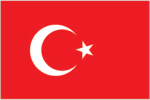Compare
Vatican City
to
Turkeyto
TurkeyVatican City is a city-state within Italy and the seat of Roman Catholicism
There's really just not enough data on Vatican City to relate it to other countries, so we're just having some fun here.
 With its 81,619,392 people, Turkey is the
16th largest country in the world by
population. It is the 37th largest country in the
world by area with 783,562 square kilometers.
With its 81,619,392 people, Turkey is the
16th largest country in the world by
population. It is the 37th largest country in the
world by area with 783,562 square kilometers.
Modern Turkey was founded in 1923 from the Anatolian remnants of the defeated Ottoman Empire by national hero Mustafa KEMAL, who was later honored with the title Ataturk or "Father of the Turks." Under his leadership, the country adopted wide-ranging social, legal, and political reforms. After a period of one-party rule, an experiment with multi-party politics led to the 1950 election victory of the opposition Democratic Party and the peaceful transfer of power. Since then, Turkish political parties have multiplied, but democracy has been fractured by periods of instability and intermittent military coups (1960, 1971, 1980), which in each case eventually resulted in a return of political power to civilians. In 1997, the military again helped engineer the ouster - popularly dubbed a "post-modern coup" - of the then Islamic-oriented government. Turkey intervened militarily on Cyprus in 1974 to prevent a Greek takeover of the island and has since acted as patron state to the "Turkish Republic of Northern Cyprus," which only Turkey recognizes. A separatist insurgency begun in 1984 by the Kurdistan Workers' Party (PKK) - now known as the Kurdistan People's Congress or Kongra-Gel (KGK) - has dominated the Turkish military's attention and claimed more than 30,000 lives. After the capture of the group's leader in 1999, the insurgents largely withdrew from Turkey mainly to northern Iraq. In 2013, KGK and the Turkish Government agreed to a ceasefire that continues despite slow progress in ongoing peace talks. Turkey joined the UN in 1945 and in 1952 it became a member of NATO. In 1964, Turkey became an associate member of the European Community. Over the past decade, it has undertaken many reforms to strengthen its democracy and economy; it began accession membership talks with the European Union in 2005.
Check out the recommended reading list below for great sources of information on Turkey